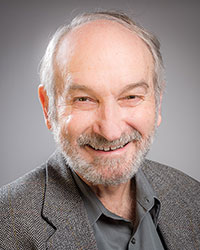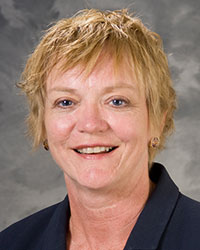UW Department of Family Medicine and Community Health colleagues gathered at the Pyle Center on November 1, 2022, to listen to a special lecture by Eugene and Linda Farley Visiting Professor Dr. Arthur Kaufman, honor Dr. Sandra Kamnetz with the Chair’s Award and recognize the Frey Writing Award recipients.
Watch 2022 Farley-Frey Ceremony
Dr. Kaufman’s lecture, “Reviving the Social Mission of Academic Health Centers: Beyond Flexner Alliance,” addressed the significance of social determinates of health and how academic health centers can improve their community health efforts.
History of Medical Schools
Kaufman’s brief history of the medical education process in America served as a reminder that though steps to eliminate proprietary medical schools and establish academic standards and partnerships were made following the Flexner Report in 1910, women and minorities were marginalized with limited access to medical education and clinical experiences. The Beyond Flexner Alliance grew in response to Flexner’s exclusionary approach and embraced Rudolf Virchow’s philosophy that medicine is a social and political science.
A Social Mission
The social science of medicine promoted by Virchow inspired a greater focus on the social determinants of health which Kaufman described with stories from his own experiences. In one example, Kaufman shared a report that revealed the Native American population in New Mexico get the best screening and treatment for diabetes, but also have the highest death rate from that disease.
“A good health care system cannot make up for decades of poor housing, low education, low income, social exclusion, marginalization and racism,” explained Kaufman.
The University of New Mexico (UNM) Health Sciences Center has taken steps to address social needs with a variety of programs. A partnership with a local community college trains medical assistants for free and removes the tuition debt these workers, some of the lowest paid in health care, incur upon graduation. They’ve also added community health workers to the clinics to help address adverse social determinants when patients arrive for an appointment and hope to train all health providers, students, residents, faculty, and staff in social determinants with a modular curriculum. In response to the epidemic of loneliness in the elderly, UNM launched Senior Care Calls Initiative 2020—a program that encouraged volunteers, including many nursing and medical students, to talk with patients over the phone. All these efforts may seem like small wins for such a large problem, but that’s exactly what is needed to improve health care for everyone, according to Kaufman.
“We need to design a system where there are quick wins and people feel like they’re making a difference,” concluded Kaufman.
About Dr. Kaufman

Arthur Kaufman, MD
Arthur Kaufman, MD, is a distinguished professor of family and community medicine at the University of New Mexico. He received his MD from the State University of New York in Brooklyn in 1969 and completed his residency in internal medicine at St. Vincent’s Hospital in New York City in 1974.
He served in the US Indian Health Service in South Dakota and New Mexico before joining the Department of Family and Community Medicine at the University of New Mexico in 1974. Dr. Kaufman helped initiate the primary care curriculum in New Mexico, which became an international model for change by innovative track in traditional medical schools. He is the director of New Mexico’s WHO Collaborating Center. In 1999, he was elected secretary general for the network: Towards Unity for Better Health – a WHO-affiliated nongovernmental organization. He received national and international teaching awards including the Five-Star Doctor Award from the World Organization of Family Doctors (WONCA) in 2008. In 2015, he was elected to the National Academy of Medicine/Institute of Medicine.
Chair’s Award

Sandra Kamnetz, MD
Sandra Kamnetz, MD, received the Chair’s Award for her long career supporting and caring for patients as well as her many years serving in administrative roles as a champion for DFMCH physicians.
Kamnetz has practiced full scope family medicine at the UW Health Yahara Clinic for over 30 years. Until recently, she also served as the vice chair for Clinical Care advocating for DFMCH clinicians and acting as their ambassador to the UW System.
Chair David Rakel praised her dedication to patients and likened her nurturing spirit and exceptional clinical skills to those of a gardener and mechanic.
“Sandy tends her garden with the utmost passion and expertise, and like any good gardener, is tolerant of the prick of the thorn to allow for the full potential of the rose,” said Rakel.
Upon accepting the award, Kamnetz cited her work on the primary care compensation plan, Primary Care Leadership Committee and COVID response team as some of her proudest accomplishments. She also acknowledged the clinical staff that she’s worked with for over three decades including only two different nurses and medical assistants during that span.
“To have the same staff over a long career makes for a very special team,” added Kamnetz.
Frey Writing Award Recipients
The Farley Frey Ceremony also recognized this year’s John Frey Writing Award recipients. The Frey Writing Awards were established in 2010 to honor John Frey, III, MD, past chair of the DFMCH, and to recognize and encourage individual creative writing.
Poetry
- The Pronouncement Exam (Melanie Biegler, DO)
- Before you (Maureen Goss, MPH)
- Pieces of Wood (Maggie Larson, DO)
- The Ride (Caitlin Regner, MD)
- a million (Jon Temte, MD, PhD)
Prose
- Vigil (Maddie Batzli)
- Regarding the Snow Peas (Aynsley Hartney)
Read all of the submissions: 2022 Frey Writing Awards Booklet (PDF)
Photos from the 2022 Farley-Frey Ceremony
Published: November 2022
